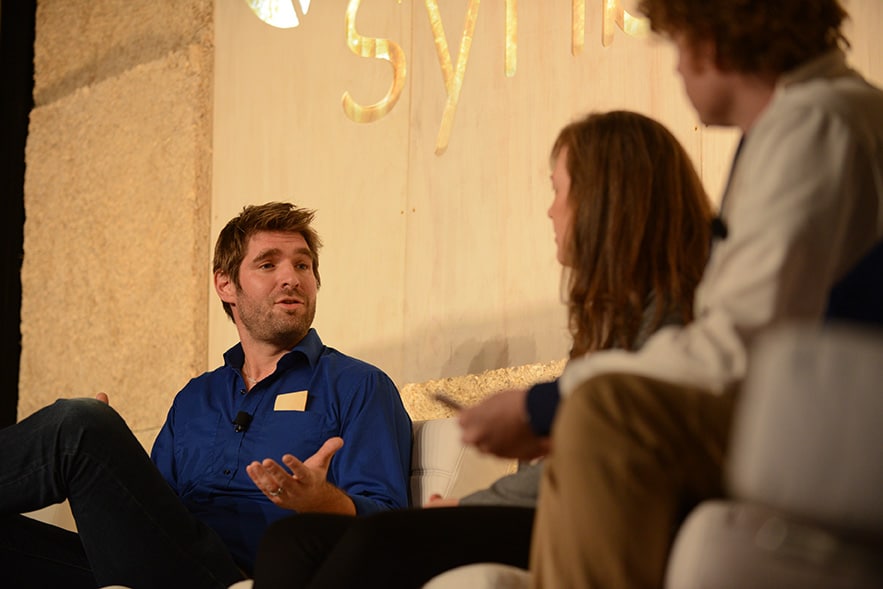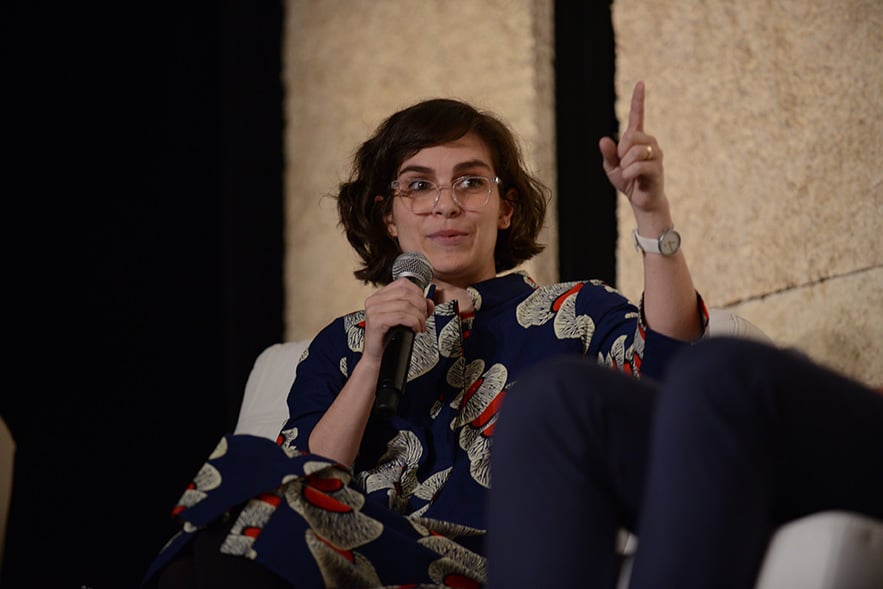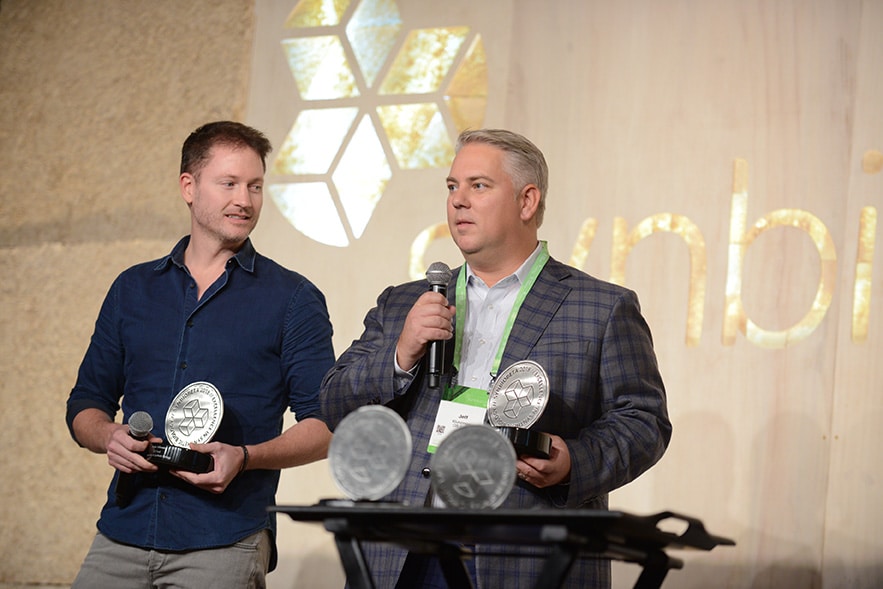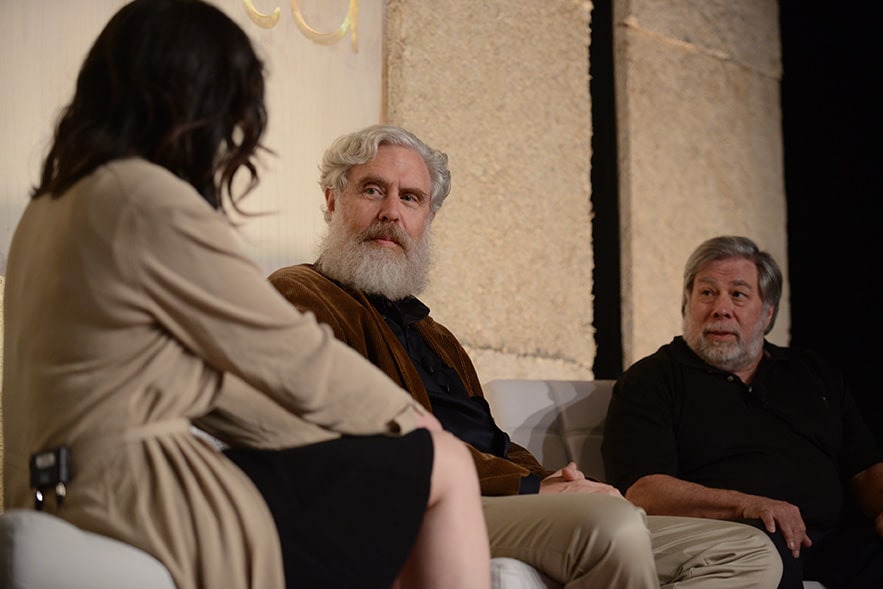Highlights of Day 1 of SynBioBeta 2018: Mushroom stage, The homebrew computer club meets DIYBio, Engineering Biology Awards
Oct 2, 2018
Enjoying Synthetic Biology Week? Share your stories with #synbiobeta2018
The conference began with a discussion between P&G Director Lee Ellen Drechsler and Ecovative CEO Eben Bayer, moderated by D.A. Wallach of Inevitable Ventures. The three discussed how biology is being harnessed to disrupt plastics, packaging, fabrics, and more.
A central theme: it’s not enough to mimic products already on the market. “People will buy things if they are better,” said Drechsler. “I really believe that using bio-based chemistry, we can make things we couldn’t make before.” P&G is one of many Fortune 500 companies embracing biotechnology (and in attendance at SynBioBeta). “Performance is what really matters to consumers,” echoed Bayer.
The trio spoke on a platform that brought their message to life — Ecovative has once again manufactured a mushroom stage for our event! Built from Earth-friendly fungal fibers called mycelium, the mushroom stage is a proud addition to SynBioBeta.
“Be creative, find a small-scale niche, and build something that is beautiful and new.” – Eben Bayer

Next up was a panel on the future. A new generation is reimagining the role of biology in marketplace — how are educators, investors and customers to react? SynBioBeta founder John Cumbers was joined in discussion with Stephanie Marrus, Johannes Fruehauf, Richard Kitney, Nicholas Toriello, and Christina Agapakis.
The panelists honed in on a key issue faced by high-tech entrepreneurs: technical education reliably fails to give young people the business and interpersonal skills needed to actually make a dent in the market. We may produce scientists who excel at research, “but it is totally different to have to come up with a business plan,” said Marrus.
“You need to understand exactly what a product is — it’s difficult to wrap your head around.” — Richard Kitne
Programs like iGEM, SynBiCITE, and Marrus’s own Entrepreneurship Center at UCSF are essential for filling that gap. “We first have to learn that there are skills you need to learn and people you need to work with to sell a product,” said Agapakis. “We tend to think the data speaks for itself.”

Christina Agapakis believes in the power of story.
Later on the mushroom stage, we presented this year’s Engineering Biology awards. Congrats to Christina Agapakis, Bryan Johnson, Jeffrey Klunzinger, Paul Freemont, and Richard Kitney!
Johnson, recipient of a Leadership in Synthetic Biology Award along with Jeffrey Klunzinger, on what he hopes future generations will ask: “Can you believe people used to think that the most advanced technologies are outside of them?”

Bryan Johnson (left) and Jeffrey Klunzinger (right) receiving their Engineering Biology awards.
Our final Monday event was one of the most significant in SynBioBeta’s history: Apple co-founder Steve Wozniak and Harvard/MIT geneticist George Church met for a fireside chat, moderated by Eri Gentry, co-founder of BioCurious.
The room was packed for this free-wheeling discussion that touched on the role of open sourcing (“Looking back at Apple, some of our biggest jumps where when things were open source.” — Woz); the good and bad sides of hacking (“Maybe a little bit more surveillance is appropriate.” — GC); the importance of building a diverse team (“They’ll keep you from going off the cliff.” — GC); and the power of the do-it-yourself mindset (“Homebrew computer club was the most important experience of my life. — Woz).

Give yourself time when you are young to work on your own ideas, or you might run out of time. – Steve Wozniak
Day one was bookended by kickoff parties sponsored by Labcyte, the company helping researchers and product developers crank up their throughput with revolutionary new liquid handling tools.
The night owls headed off to an after party, but I can’t help thinking: Biologists, technologists, investors and artists all gathering in San Francisco in 2018 to discuss the future of synthetic biology? Talk about right place, right time.
Other announcements:
– SILICON ARRAYS FOR DNA SYNTHESIS: Evonetix is partnering with LioniX International to scale up a new, high-throughput DNA synthesis platform. It combines high-fidelity synthetic chemistry (based on Evonetix’s thermally controlled minireactors) and LioniX’s prowess in manufacturing precise, thermally programmable silicon arrays. 10,000 minireactors humming on a chip = 10,000 new DNA oligos, made in parallel.
– COMPUTER AIDED BIOLOGY: Will humans be the ones researching biology in 2030? Sort of. Synthace has just published a visionary white paper detailing “how biological research will be transformed by an emerging ecosystem of tools that augment human capabilities.” Read it here.
Mammoth Biosciences CEO Trevor Martin and Ursheet Parikh of Mayfield, a Series A investor in Mammoth, spoke with SynBioBeta about how platform-based companies like Mammoth are transforming synthetic biology. They will further discuss this topic at SynBioBeta 2018.

















